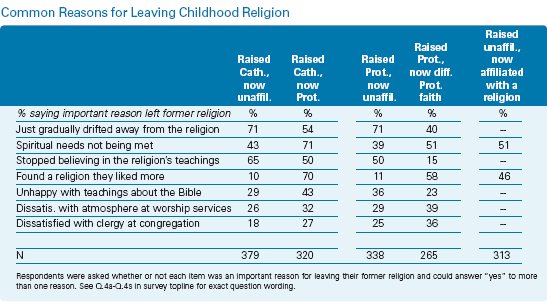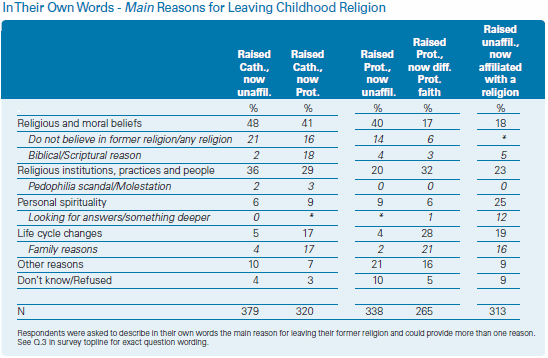That's interesting. Would you elaborate on that, please?
Sure thing.
In Evangelical churches, many pastors are being taught and thus preaching from the pulpit outright heresies, like the abomination of sacrilege that is the so-called "
prosperity gospel" and American nationalism, to the exclusion of immigrants, in plain violation of the ethic of the Good Samaritan. The problem here is actually theological: there needs to be a change in the actual ecclesiastical culture itself, because this bad theology (and really, it's ****-poor) is infecting the minds of the laity. So we have a top-down, as well as bottom-up crisis in the Evangelical denominations.
In the Catholic Church, it's rather different. The hierarchy in the U.S., and internationally in the Vatican, has long clashed with the Religious Right on hot-button issues like immigration, healthcare, gun ownership, preferential options for the poor/social welfare and a host of other areas. Encyclicals have been published by popes. Trump's desire to build a wall on the Mexican border was actually explicitly called out by Pope Francis as abhorrent to the Christian injunction to welcome the stranger in need.
It isn't new. In 1986, during the Reagan era, the Catholic Bishops Conference in the U.S. issued a document entitled
Economic Justice for All, in which they wrote:
"...The tax system should be continually evaluated in terms of its impact on the poor...First, the tax system should raise adequate revenues to pay for the public needs of society, especially to meet the basic needs of the poor. Secondly, the tax system should be structured according to the principle of progressivity, so that those with relatively greater financial resources pay a higher rate of taxation. The inclusion of such a principle in tax policies is an important means of reducing the severe inequalities of income and wealth in the nation. ... Thirdly, families below the official poverty line should not be required to pay income taxes. Such families are, by definition, without sufficient resources to purchase the basic necessities of life. They should not be forced to bear the additional burden of paying income taxes...More specifically, it is the responsibility of all citizens, acting through their government, to assist and empower the poor, the disadvantaged, the handicapped, and the unemployed...Government may levy the taxes necessary to meet these responsibilities, and citizens have a moral obligation to pay those taxes..."
Economic Justice for All (#123), pastoral letter promulgated by the United States Conference of Catholic Bishops, 1986
But many lay-persons, with conservative political values, deny the church's moral right to proclaim binding doctrine in these areas.
On the left, you have prominent Catholics like Joe Biden who say that they are "
personally opposed to abortion, but will not try to curtail it legislatively". That's a perfectly sane position to take. We cannot, and should not aspire to impose, our religious values on others when the issue in question is so divisive. Any efforts should seek to influence the conscience of people, not use the legal system to penalize people making such impossibly difficult decisions.
But the position of right-wing Catholics on the issues I've just mentioned, where they overtly flout church teaching, actually seeks to
deny the social doctrines or the church's right to authoritatively proclaim it. It's not a case of, "I personally agree but we can't enforce this" or "I struggle with this but respect the pope's right to say it", rather it's "I don't personally agree, the pope has no right to say this, I know better than the Magisterium".
You get my drift?
This is a serious problem.
I'll give you another example. In 1967, Pope Paul VI issued a social encyclical entitled
Populorum Progressio, in which he stated:
"24... Consequently, it is not permissible for citizens who have garnered sizable income from the resources and activities of their own nation to deposit a large portion of their income in foreign countries for the sake of their own private gain alone, taking no account for their country's interests; in doing this, they clearly wrong their country.
33 Individual initiative alone and the interplay of competition will not ensure satisfactory development. We cannot proceed to increase the wealth and power of the rich while we entrench the needy in their poverty and add to the woes of the oppressed. Organized programs are necessary for "directing, stimulating, coordinating, supplying and integrating" (35) the work of individuals and intermediary organizations
However, certain concepts have somehow arisen out of these new conditions and insinuated themselves into the fabric of human society. These concepts present profit as the chief spur to economic progress, free competition as the guiding norm of economics, and private ownership of the means of production as an absolute right, having no limits nor concomitant social obligations.
This unbridled capitalism paves the way for a particular type of tyranny, rightly condemned by Our predecessor Pius XI, for it results in the "international imperialism of money."(26)
Such improper manipulations of economic forces can never be condemned enough; let it be said once again that economics is supposed to be in the service of man. (27)
[This] type of capitalism, as it is commonly called, has given rise to hardships, unjust practices, and fratricidal conflicts that persist to this day..."
Here was the response from some 'Conservative' Catholics writing in popular American newspapers:
Wall Street Journal (30 March 1967) 14. "Pope Paul's encyclical lends the mantle of religion to certain ideas which are profoundly secular in origin, and advocates programs of a type now undergoing widespread reappraisal by their one-time secular sponsors....The trouble with making religious tenets of this souped-up Marxism is that it is highly unlikely to help the bulk of poor nations (which) suffer not from an excess of capitalism, but from a paucity of it.... It is both curious and sad that these mistaken attitudes toward foreign aid should now be advanced from the realm of religion. For the realm of history, as more people are starting to recognize, shows that they impede rather than advance the development of peoples."
Time (7 April 1967) 70. The encyclical has a "radical tone," and parts of it "had the strident tone of an early 20th century Marxist polemic." Its "blunt attack on capitalism" is aimed at an old-style capitalism that is dead. "It was surprising that he did not acknowledge the way in which business enterprise has developed into a creative, socially conscious component of the industrial West." Populorum Progressio was humanistic, "but its perspective was that of another time."
The Economist (8 April 1967) 114. Some communist papers claimed that Pope Paul gives the imprimatur to Marx's works, justifies revolutions, and condemns all capitalist and imperialist exploitation. Some right-wing newspapers seem unable to find words to discuss the encyclical at all.
Sound familiar? American capitalists have responded
exactly the same way to Pope Francis's
Evangelii Gaudium today in 2013.
Did you read above what the Early Church, in the first century
Didache, was proclaiming as the "Teaching of the Twelve Apostles"? i.e.
The way of death is this...turning away from him that is in want, afflicting him that is distressed, advocates of the rich, lawless judges of the poor, utter sinners. Be delivered, children, from all these...Never turn away the needy; share all your possessions with your brother, and do not claim that anything is your own (cf. Acts 2:44-45)
I guess they also didn't have the "authority" to proclaim this "souped-up Marxism" either, eh?


